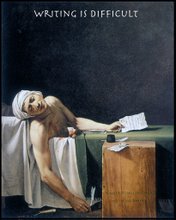Subscribe to:
Post Comments (Atom)
skip to main |
skip to sidebar


"[T]here's a certain grain of stupidity that the writer of fiction can hardly do without, and this is the quality of having to stare, of not getting the point at once. The longer you look at one object, the more of the world you see in it..."
Blowing your mind one sentence at a time
And now a word from Professor Obvious...

Books We're Reading
- Invisible Cities by Italo Calvino
- Nine Stories by J.D. Salinger
- The Dog of the Marriage by Amy Hempel
- Cowboys Are My Weakness by Pam Houston
- How to Breathe Underwater by Julie Orringer
- Pastoralia by George Saunders
- Tooth and Claw by T.C. Boyle
- What We Talk About When We Talk About Love by Raymond Carver
- WHAT ELSE? Remind me what you're reading in your next blog entry...
Flannery says:

"[T]here's a certain grain of stupidity that the writer of fiction can hardly do without, and this is the quality of having to stare, of not getting the point at once. The longer you look at one object, the more of the world you see in it..."
Writing Links
Blog Archive
-
▼
2007
(162)
-
▼
June
(153)
- Thank you and a question for Rachel
- didn't write. Ate a burger instead.
- Thanks Everyone!
- UGH. Brain hurts. Need sleep. I read four chapt...
- Stories
- Whew.
- Ugh
- Midnight Cowboy
- im starting to lose it. im reading and writing and...
- omg
- Thanks
- Latest Stories
- so...
- Refugee All Stars
- Revision
- stories
- Workshop Comments
- comments
- Finished reading the stories last night, and am do...
- If paper didn't cost trees....
- Finished reading
- Comments are done
- Day 12
- Are we supposed to keep blogging?
- Enjoyed the stories
- I am finally done! I know, one hour before class.....
- Yesterday I got five pages. Today I got three and...
- Don't "over-read-into" my story, take it at face v...
- finishing touches
- Finishing up...
- ?....
- I'm done except for one scene for which I have fou...
- ..also
- Finally...
- Side effects may cause depression and or anxiety.
- Day 11
- Finished! Kinda...
- Ok, so I know that I was supposed to stick with wh...
- No Time!!
- A little late
- Satisfaction
- working hard
- florida
- ..
- Day 10
- Here is my question
- friday
- O's Massacre
- Friday
- Ok I have another question to ask everybody - one ...
- Ok, I'm working on a flash back and am unsure if I...
- Not enough time!
- I finally like my story
- 311 ROCKS
- thursday
- Oh Dear...
- Possible Lunch?
- And just for the record...
- conflict
- book
- Day 8
- Sorry I didn't come to class. I did, however, spe...
- Attempt 2
- Must it be so difficult?
- The Revamp
- Readings
- I know technically I'm like 26 or so minutes late ...
- Amy Hempel's "The Dog of the Marriage"
- Wednesday
- Day 7
- Just maybe...
- Getting somewhere.
- Continuing....
- hard work
- A Slight Stall
- Frustration
- Story
- almost forgot to blog tonight
- Tuesday
- Here's another one
- Completing my story....
- Writing goal met...
- From the Beginning
- Day 6
- ..
- Conflict Finally!
- monday
- Monday
- Another entry
- Day 5
- Got about 45 minutes of writing done tonight. It w...
- There and Back Again.
- Writing 5 pages
- Indecision
- Joys of Handwriting
- awake....
- Another late night entry
- Journal writing
- and counting...
- Whoops
-
▼
June
(153)
3 comments:
I'd say let the reader figure it out. Put in the little details about her condition. For instance:
On the way down the stairs she moved the picture frame back into place. Everyone's eyes would have passed by on their descent, but her's always found the smallest details in her travels.
Just my two cents, you don't have to take it.
My vote is let the reader figure it out.
I vote to let the reader figure it out, too, but if you're in omniscient point of view then you know all that the character knows and, thus, so woudl we...right? If it's from the husband's point of view, then we wouldn't necessarily know. For the record, I'm still in favor of this story having a limited third person POV, but that's just me...
Post a Comment